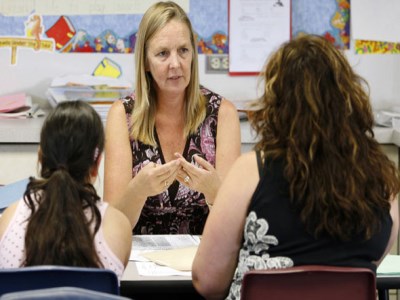
The Australian Institute for Teaching and School Leadership (AITSL) and Evidence for Learning have teamed up to create new feedback resources for schools.
According to the announcement by AITSL yesterday, the partnership will produce new resources designed to support “a whole-school” approach to enhancing teachers’ feedback practices with students.
The new evidence-based materials, which are free to access from the AITSL website, include a ‘Spotlight’ research summary, video and written case studies profiling schools already embracing effective feedback practice, and implementation and evaluation tools.
Federal Education Minister, Simon Birmingham, said the new feedback resources bring an important focus to the techniques and strategies being used to support students in class.
“It’s widely acknowledged that the most important in-classroom factor that can help student performance is our teachers, and we want to ensure teachers have the right resources at their fingertips,” Birmingham said in a statement.
“I’m pleased to see AITSL has brought together easy-to-use materials on effective feedback and the leading research on the topic, especially as we know high-quality feedback can improve student learning by up to eight months.”
Birmingham added that materials like these help teachers “cut through the hundreds of different opinions and pages of research sent their way”.
“AITSL gives them an authoritative source of information,” he said.
The materials have been developed by drawing upon global evidence and research-based approaches and will help school leaders and teachers take action to enhance feedback practices in their setting to boost learning outcomes for students.
AITSL Chair, Professor John Hattie, said while there is a wealth of evidence about the positive impact of providing effective feedback, there is very little easy-to-access information for educators on how best to implement it.
“By equipping teachers and school leaders with a suite of assets to readily apply best-practice feedback across a school, we can support them to get the most out of the approach and ensure it has the maximum impact on learning,” he said.
Director of Evidence for Learning, Matthew Deeble, said the new resources draw on approaches from a number of Australian schools that are focusing on feedback to boost teaching and learning.
“These include using creative visual tools for students to signal their level of understanding to teachers and peer-to-peer feedback,” he said in a statement.
“Put simply, effective feedback is a low-cost, high-impact approach that can produce dramatic gains in learning outcomes. These assets will support teachers to make it work for their students.”
Deeble added that the materials support the goal of giving practical support to schools to implement effective approaches.
“It’s helping to make our public investment in education more productive,” he said.


